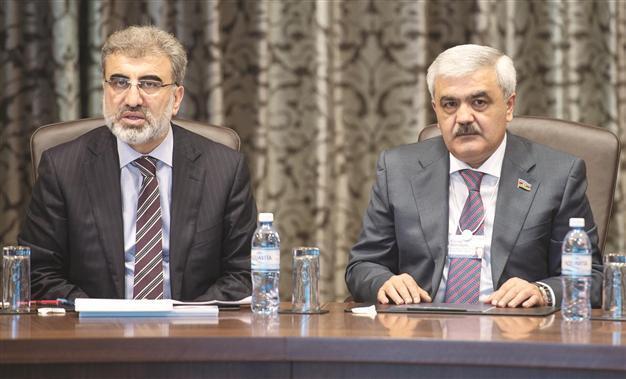Ankara invites Baku to join Mediterranean energy rush
BAKU

The Turkish Energy Minister Taner Tıldız and Azeri state-run oil firm, SOCAR President Rövnag Abdullayev answer the press questions on the sidelines of World Economic Forum held in Azerbaijan. AA photo
Turkey has extended an invitation to the State Oil Company of Azerbaijan (SOCAR) to explore offshore oil and gas reserves off the Mediterranean and Black Sea coasts of Turkey, which the Azeri oil firm is to consider and decide upon by the end of this year.“Azerbaijan can search for oil and natural gas in our waters,” Turkey’s Energy and Natural Resources Minister Taner Yıldız said on April 8 after a one-on-one meeting with SOCAR President Rövnag Abdullayev.
Yıldız, who is currently in Azerbaijan to attend the World Economic Forum, said they could carry out a partnership with SOCAR just as they had been doing with several international oil firms which explored oil and gas in Turkish seas.
According to Turkey’s deals with exploration companies, if the company reaches any resources the output is shared between the firm and the Turkish state but in the event that the searches fail to find anything, all the expenses are undertaken by the private company.“For these searches Turkey hasn’t paid a penny,” Yıldız said. Turkey would appreciate undertaking exploration operations near the southern provinces of Iskenderun, Mersin and Antalya with SOCAR under the same scheme, the minister asserted.
He added that they would also like to carry out joint projects with Azerbaijan in third countries.
Abdullayev said the company was evaluating the Turkish offer and that it would make a decision in approximately six months, or by the end of this year at the latest. Considering SOCAR’s 60-year-long experience in oil exploration in the Caspian Sea, it is capable of these operations, he said.
Mediterranean Sea has been watering the neighbouring countries’ mouth as Greek Cyprus and Israel as well have been seeking to obtain resources there through deals with international firms. Lately, Egypt joined them as it has annouced it will hold a tender for energy drilling in the Mediterranean Sea.
TANAP to be build by 2014
The chairman also commented on the two countries’ joint project, the Azeri-Turkish trans-Anatolia Pipeline (TANAP), and said the decision over the route that would transport the gas to Europe would be made by June as an agreement is due to be signed by October.
The construction of TANAP, which was actually scheduled for 2013, has been delayed to 2014, he added during the press meeting.
TANAP will bring the gas from Azerbaijan to the European terrritory of Turkey, to connect with either Nabucco -thorugh Bulgaria- or TAP -thorugh Greece.
NUCLEAR PLANT ELECTRICITY TO COST HIGH
ISTANBUL-Hürriyet Daily News
As the market price around is 7 or 8 cents/kWh, the agreement determined the fixed price at 12.35 cents/kwh for the first 15 years after Turkey’s first nuclear power plant, in the Akkuyu district of the southern province of Mersin, begins electricity generation. The Akkuyu plant will have four power units of 1,200 MW each. After construction, which is planned to start in 2015, Akkuyu is expected to produce about 35 billion kilowatt-hours per year.
Yıldız said Turkey, whose energy demand increases by 4.5 billion cubic meters a year, would start to save in the long-term. He said they aimed for the Akkuyu plant and the second-planned nuclear power plant in the northern province of Sinop to be able to satisfy 20 percent – 10 percent each – of Turkey’s electricity demand. The minister also noted that Rosatom invested $22 billion for this project by getting loans from 20 banks. Russia is the one who took the risk, he added.
Turkey procures most of its electricity from natural gas while Russia is the biggest natural gas supplier for the country.
















